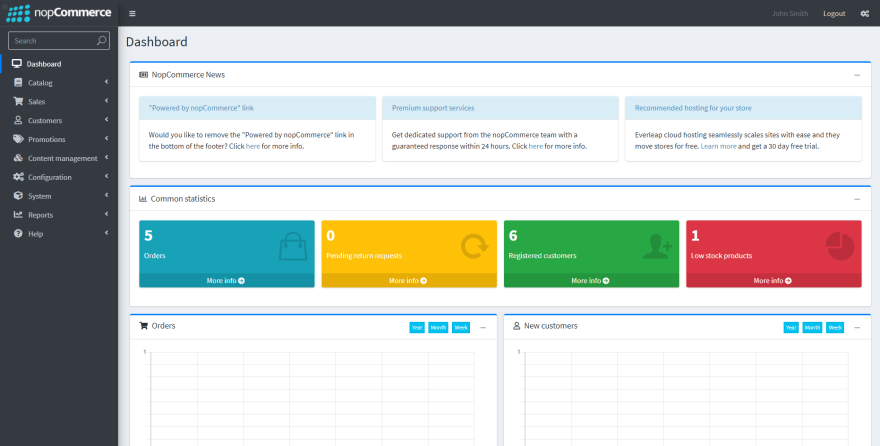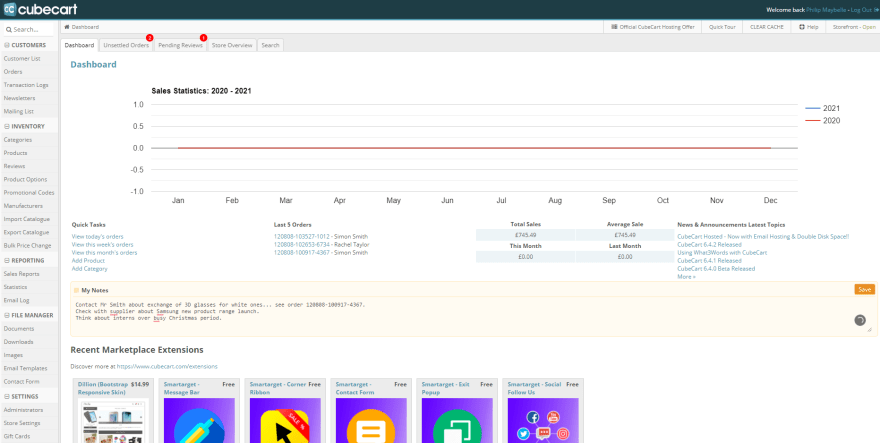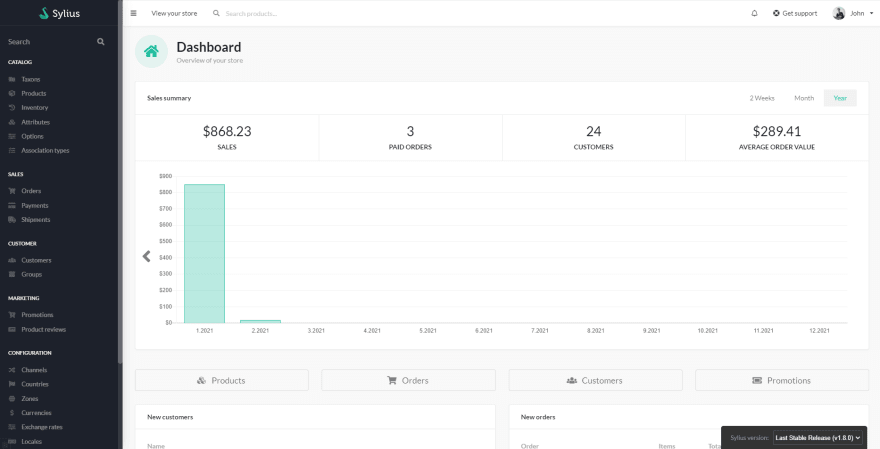The world has become more digitally interconnected and the web is the connectivity platform. Online e-commerce platforms are one of the most evolving sectors of the web, with more retailers trying to evolve their online presence or completely shift operations online.
E-commerce platforms facilitate digital retail and operations. They give businesses greater visibility into e-commerce growth and help teams coordinate merchandising, marketing, sales, and fulfillment efforts across channels.
Whether you’re a high-growth brand or an established business trying to improve digital sales and experiences, there are dozens of e-commerce platforms to choose from. In this post, we’ll review the best open source e-commerce platforms and list the pros and cons of open source and software-as-a-service options.
Open Source Vs SaaS E-Commerce Platforms
When selecting an e-commerce platform, one of the main challenges is choosing between an open source and software-as-a-service option. Below we look at the differences between each option.
| Open Source | SaaS | |
|---|---|---|
| Customization | Yes (Code-Level Customization) | Yes (Granularity Dependent on Provider) |
| Database Management | Yes | No |
| Infrastructure Configuration | Yes | No |
| Infrastructure Maintenance | Yes | No |
| Setup Difficulty | Medium/High | Low |
| Technical Expertise | High | Low/Medium |
| Features | Community Dependent | Platform Dependent |
| Security and Compliance | Unmanaged (User Responsibility) | Managed (Provider Responsibility) |
| External Integrations | Yes | Yes |
| Licensing/Subscription Fees | No | Yes |
| Support | Community Based Support | Dedicated Support |
The main takeaway is that open source options give you complete control but require more resources to configure and maintain; SaaS options take care of these requirements for you while still giving you the ability to create robust backend systems and unique frontend shopping experiences.
Open Source E-Commerce Platforms
In this section, we will go through the best available open source e-commerce platforms and compare their features. The following platforms will be used for the comparison:
| nopCommerce | Shopware | CubeCart | Sylius | Solidus | |
|---|---|---|---|---|---|
| Multi-Store and Multi-Vendor | ✅ | ✅1 | ❌ | ✅6 | ✅ |
| Mobile support | ✅ | ✅ | ✅5 | ✅ | ✅ |
| Product Management | ✅ | ✅ | ✅ | ✅ | ✅ |
| Multiple Payment Providers | ✅ | ✅2 | ✅ | ✅ | ✅ |
| Shipping/Logistic Management | ✅ | ✅ | ✅ | ✅ | ✅ |
| Integrated Marketing/ Analytics | ✅ | ✅ | ✅5 | ✅ | ✅ |
| 3rd Party Integrations/Plugins | ✅ | ✅ | ✅ | ✅ | ✅ |
| Internationalization | ✅ | ✅ | ✅ | ✅ | ✅ |
| API Availability (Headless) | ❌ | ✅ | ❌ | ✅ | ✅ |
| Docker/K8 Support | ✅ | ✅3 | ❌4 | ✅ | ✅ |
| Premium Offering | ✅ | ✅ | ✅ | ✅ | ❌ |
1 - Multi-Vendor is supported via plugins
2 - Direct integration with PayPal and others through plugins
3 - Docker installation is not recommended for macOS due to performance
issues
4 - Third-party docker containers are available
5 - Supported via plugins
6 - Premium Feature
nopCommerce
 nopCommerce is an ASP.NET-based e-commerce platform released in 2008 with the purpose of providing a feature-rich, free, and open source e-commerce platform. nopCommerce is designed to support SMBs to perform enterprise-level operations.
nopCommerce is an ASP.NET-based e-commerce platform released in 2008 with the purpose of providing a feature-rich, free, and open source e-commerce platform. nopCommerce is designed to support SMBs to perform enterprise-level operations.
nopCommerce is an out-of-the-box solution for all your B2B and B2C commerce needs. It provides a wide array of features such as multi-vendor / multi-store configurations, product management, payment and tax management, and customer services. This platform also supports the widest range of third-party integrations for payment modules, shipping management, marketing, and administration. Another strength is the sheer amount of customization, from simple themes to the customization of individual functions to suit the exact requirements of the user.
nopCommerce is fully compliant with PCI DSS to provide a secure payment platform to all the integrated payment methods. It meets all the requirements for GDPR compliance in the European Union and actively keeps the compliance up to date as a secure and trustworthy e-commerce platform.
Shopware
 Shopware was introduced in 2000 to provide an e-commerce platform that can help businesses move their operations online. The current implementation of Shopware utilizes Twig and Bootstrap to power the storefront while using Vue.js and twig.js to power the administration interface. This open source project is distributed under the MIT license.
Shopware was introduced in 2000 to provide an e-commerce platform that can help businesses move their operations online. The current implementation of Shopware utilizes Twig and Bootstrap to power the storefront while using Vue.js and twig.js to power the administration interface. This open source project is distributed under the MIT license.
Shopware provides the services through REST APIs and offers rich user interfaces enabling developers and administrators alike to use their preferred method to interact with the platform. This platform is developed using retailer feedback to better cater to user requirements
Shopware allows users to easily make an online e-commerce presence due to its minimal learning curve and simple and intuitive design. It supports integrations with different sales channels and social media platforms to increase visibility to customers. Both B2C and B2B business modules are supported under this platform. Furthermore, Shopware is designed to be performance-centric and highly scalable. The Plugin Manager functionality of Shopware enables users to extend this e-commerce platform with other tools and services effortlessly.
CubeCart
 CubeCart is one of the most straightforward solutions, aiming to provide a stable and secure e-commerce platform. It is a free and open source platform distributed under the GPL 3.0 license, and its security is audited by Netsparker.
CubeCart is one of the most straightforward solutions, aiming to provide a stable and secure e-commerce platform. It is a free and open source platform distributed under the GPL 3.0 license, and its security is audited by Netsparker.
CubeCart is actively developed on a regular basis and is backed by a thriving community. Moreover, it utilizes the Smarty Template Engine to create a template-driven responsive frontend. This platform provides various functionalities such as product, payment, and logistical management to fulfill all your e-commerce needs.
One of the best features of this platform is its extensive log functionality, from simple transaction logs to server error and request logs. These logs enable the platform administrators to be aware of the complete behavior of the storefront. Furthermore, CubeCart provides inbuilt support for Google Analytics and SEO tools and can be further extended using free and paid extensions.
Sylius
 Sylius is a headless e-commerce platform targeting mid-market and enterprise customers that require custom e-commerce solutions. It is built on top of the Symfony framework and developed using full stack Behavior-Driven-Development with phpspec and Behat.
Sylius is a headless e-commerce platform targeting mid-market and enterprise customers that require custom e-commerce solutions. It is built on top of the Symfony framework and developed using full stack Behavior-Driven-Development with phpspec and Behat.
This open source platform is freely available and distributed under the MIT license. Sylius is designed to be the nexus of your e-commerce stack. Due to the headless nature of the platform, developers are given the freedom to build custom interfaces to suit the desired sales channel whether it’s a mobile platform, point of sale kiosk, or a progressive web app.
Sylius can be used out-of-the-box with its provided functionality or can be integrated into an existing PIM, CRM, or Automation software using the powerful REST API. The platform can be extended further using Sylius plugins which add more functionality from simple content and customization options to complex reporting and analytics features.
Solidus
 The Solidus e-commerce platform is developed using Ruby on Rails. The project started its life as a fork of the Spree Commerce platform and gradually evolved into a fully-featured e-commerce platform.
The Solidus e-commerce platform is developed using Ruby on Rails. The project started its life as a fork of the Spree Commerce platform and gradually evolved into a fully-featured e-commerce platform.
This platform is targeted towards digitally native brands and fast-growing online businesses with a high focus on stability, flexibility, and scalability. What sets this platform apart from others is its adherence to the open source mindset. It consists of a well-defined and public roadmap for development and receives transparent funding through the Open Collective Solidus community.
Solidus offers both RESTful API and GraphQL API to make a truly headless e-commerce experience. The three main components of Solidus are Product Catalog, Payment, and Logistics. The product section provides inventory and product management, while the payment component manages payment integrations, subscriptions, and taxations. Finally, the logistic management tackles the shipping, returns, and exchanges.
E-Commerce Platforms: Best SaaS Option
The best option to gain a truly out-of-the-box experience without worrying about complex configurations or infrastructure would be a SaaS e-commerce solution. SaaS solutions will take care of complex, time-consuming, and mundane tasks such as server management, security patching, and system maintenance, and allow business users to focus on providing the best possible e-commerce experience to customers.
Among numerous available SaaS solutions is Fabric, a headless commerce platform.It offers robust functionality with specialized features such as a Product Information Manager and Order Management System to provide a comprehensive, all-in-one platform.
It also offers tailored features like Storefront to fast track development of a digital store and Experience Manager to create user- and channel-specific experiences. Additionally, a fully customizable API enables developers to extend the functionality to match their requirements.
Fabric also offers a service to get your application up and running at every stage of the development process. By choosing a SaaS platform like Fabric, you can enjoy all these benefits without having to worry about infrastructure and complex technical considerations.
The best online JS tools can be found at HTML-CSS-JS.com: script beautifier, compressor, cheat sheet or just read the blog.




















